新外研版九年级英语上Module6Problems
九年级英语上册Module6Problems模块测试题(新版)外研版(2021年整理)
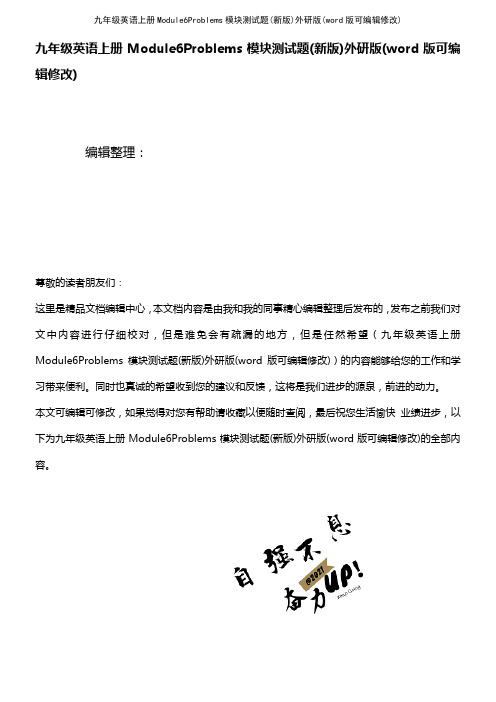
九年级英语上册Module6Problems模块测试题(新版)外研版(word版可编辑修改)编辑整理:尊敬的读者朋友们:这里是精品文档编辑中心,本文档内容是由我和我的同事精心编辑整理后发布的,发布之前我们对文中内容进行仔细校对,但是难免会有疏漏的地方,但是任然希望(九年级英语上册Module6Problems模块测试题(新版)外研版(word版可编辑修改))的内容能够给您的工作和学习带来便利。
同时也真诚的希望收到您的建议和反馈,这将是我们进步的源泉,前进的动力。
本文可编辑可修改,如果觉得对您有帮助请收藏以便随时查阅,最后祝您生活愉快业绩进步,以下为九年级英语上册Module6Problems模块测试题(新版)外研版(word版可编辑修改)的全部内容。
Module 6标准检测卷(满分:120分时间:100分钟)题号一二三四五六七八九十十一总分得分听力部分(20分)一、听句子,选出与所听内容相符的图片(每小题1分,共5分)A. B. C.D. E.1.________ 2.________ 3。
________4.________ 5.________二、听句子,选择正确的答语(每小题1分,共 5分)6.A.I have too many after。
school classes.B.He is Tom. C.That's right。
7.A。
He doesn't have time。
B.He loves the ball game.C.He should call him up。
8.A.It doesn’t mat ter. B.That’s a good idea。
C.What a pity!9.A.I don't like to do that。
B.Sorry,I don’t have any。
C.Yes,you do。
10.A。
Why don't you talk with your family?B.It's good。
Module+6+Problems+作文整理 外研版九年级英语上册
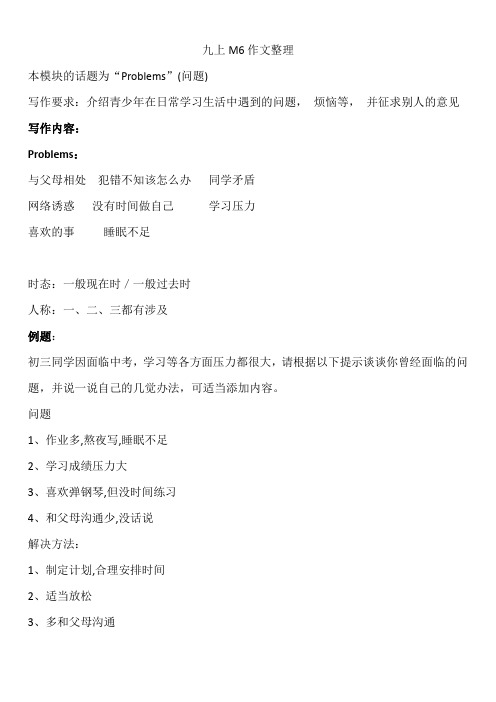
九上M6作文整理本模块的话题为“Problems”(问题)写作要求:介绍青少年在日常学习生活中遇到的问题,烦恼等,并征求别人的意见写作内容:Problems:与父母相处犯错不知该怎么办同学矛盾网络诱惑没有时间做自己学习压力喜欢的事睡眠不足时态:一般现在时/一般过去时人称:一、二、三都有涉及例题:初三同学因面临中考,学习等各方面压力都很大,请根据以下提示谈谈你曾经面临的问题,并说一说自己的几觉办法,可适当添加内容。
问题1、作业多,熬夜写,睡眠不足2、学习成绩压力大3、喜欢弹钢琴,但没时间练习4、和父母沟通少,没话说解决方法:1、制定计划,合理安排时间2、适当放松3、多和父母沟通短语储备:1、in trouble 陷入困境2、as soon as 一…就…3、get into the habit of 养成…的习惯4、at least 至少5、communicate with sb 和某人交流6、be tired of 厌烦/厌倦…7、had better do sth 最好做某事8、be worried about=worry about 担心9、to do list人物清单10、try one's best to do sth 尽某人最大的努力做…11、be allowed to do sth 被允许做某事12、too much 太多13、be afraid of doing sth害怕做某事14、decide to do sth 决定做某事15、be sure确信开头句:(开篇点题,引出本文主旨)1、Everyone has their own trouble, so do I.2、I always meet many problems in my study and life. Now I want to share with you and tell you my ways of solving these problems.3、Many adults said that our children don't have worries, but actually we do have. Let's talk about them.中间句:(问题和措施分两端写)1、I feel nervous because…2、I have too much…to do, and I don't have time to rest.4、I love…but I don't have enough time to practise/do it.3、I'm really tired of…5、I'm not allowed to do sth.6、I'm afraid to do sth because…他人的问题:1、I'm sorry to hear that+对方遇到的问题2、I'm glad to receive your letter and give you my suggestions.(措施:如何解决这些问题,用到情态动词)1、First, I should/You should….2、Second, I asked my teacher and friends for some advice.3、Third, I decided to make some plans at the begining of the day.4、What's more, I will try my best to do sth.5、I found some proper ways to relax myself, such as…给他人提建议:1、First, you should…2、Second, you can ask your teacher or friends for some advice.3、What's more, you had better make some plans before studying.You should get into the habit of making plans before studying.5、If I were you, I would…6、I think it would be better if you…结尾句:(表明自己的决心/希望自己的意见对他人有用)1、All in all, the problems that we met are challenges, if we beat them, we will make a great progress.2、No matter what kind of difficulties I face, I will never give up.给他人提建议的话:1、I hope my suggestions can help you.2、I hope you like my suggestion.3、No matter what happens, please don't give up.范文:Many adults said that children don't have worries, but actually we do have. I always meet many problems in my study and life. Now I want to talk about them with you.As a middle school student, we have lots of homework to do.In order to finish my homework on time, I have to stay up late at night, so I don't have enough time to sleep. I have too much study pressure. And my parents don't understand me, we have little communication with each other. What's more, I love piano, but I don't have time to practise it, so I feel really sad about that.But what should I do? First, I will get into a habit of making plans for my study. I'd like toright way to relax myself, such as listening to music, watching TV or going out to have a walk. Third, I will communicate with my parents more often, I can tell them what happened in school or the book that I read.All in all, the problems that we met are challenges, if we beat them, we will become a better person.另外一种考察形式(来源于网络)下面是某报刊登出的一封读者来信,请你以编者Cathy的身份给这位同学回信,并针对她的问题给出合理的建议。
初三英语上册(外研版)Module 6 Problems 知识点总结

初三英语上册(外研版)Module 6 Problems知识点总结一、重点词汇guitar·原文再现Tony is spending too much time playing the guitar, and he may fail his exams.托尼花了太多时间弹吉他,他这次考试不合格。
·基本用法guitar n. 吉他,play the guitar意为“弹吉他”,在西洋乐器如violin小提琴,piano钢琴,flute长笛,cello大提琴,guitar吉他等前面都要用定冠词。
在球类或棋类前不用定冠词,如:play golf 打高尔夫球play cricket 打板球play hockey打曲棍球play volleyball 打排球play badminton打羽毛球play table tennis 打乒乓球play baseball 打棒球play chess下棋。
fail·原文再现Tony is spending too much time playing the guitar, and he may fail his exams.托尼花了太多时间弹吉他,他这次考试不合格。
·基本用法1. fail vt. 未能及格;未能达到,其后可以直接跟宾语,fail his exams意为“考试不及格”。
(过去式:failed 过去分词:failed 现在分词:failing 第三人称单数:fails)George failed history last semester.乔治上学期历史考试不及格。
2. fail vi. 失败;不及格,fail in (doing) sth.意为“做某事失败”。
如:She failed in the examination.她这次考试不及格。
She failed in finishing the work on time.她未能按时完成工作。
外研版九年级英语上册《Module6ProblemsUnit3》说课稿

外研版九年级英语上册《Module 6 Problems Unit 3》说课稿一. 教材分析外研版九年级英语上册《Module 6 Problems Unit 3》的主要内容包括两部分。
第一部分是关于如何描述和解决生活中遇到的问题,第二部分是关于如何提出建议和意见。
本节课的主要目的是让学生能够运用所学的词汇和语法知识,描述生活中遇到的问题,并提出解决问题的建议。
二. 学情分析九年级的学生已经具备了一定的英语基础,能够听懂并运用一些基本的英语词汇和句型。
但是,他们在运用英语进行口语表达和写作方面还存在一定的困难。
因此,在教学过程中,需要注重培养学生的口语表达能力和写作能力。
三. 说教学目标1.知识目标:学生能够掌握本节课所学的词汇和句型,并能够运用它们描述生活中遇到的问题,并提出解决问题的建议。
2.能力目标:学生能够运用所学的词汇和句型进行口语表达和写作,提高他们的口语表达能力和写作能力。
3.情感目标:通过本节课的学习,学生能够学会如何面对生活中的问题,并积极寻求解决问题的方法。
四. 说教学重难点1.教学重点:学生能够掌握本节课所学的词汇和句型,并能够运用它们描述生活中遇到的问题,并提出解决问题的建议。
2.教学难点:学生能够运用所学的词汇和句型进行口语表达和写作,特别是在描述复杂问题时能够准确表达。
五. 说教学方法与手段在本节课的教学过程中,我将采用任务型教学法和交际型教学法。
通过设定各种真实的任务和情境,引导学生运用所学的词汇和句型进行口语表达和写作。
同时,我还将运用多媒体教学手段,如图片、视频等,来辅助教学,提高学生的学习兴趣和参与度。
六. 说教学过程1.导入:通过展示一些生活中常见的问题的图片,引导学生谈论这些问题,并激发他们对本节课的兴趣。
2.呈现:通过展示一段关于生活中问题的视频,引导学生听懂并理解所学的词汇和句型。
3.练习:通过设定各种任务和情境,让学生运用所学的词汇和句型进行口语表达和写作。
最新外研版英语九年级上册Module 6 Problems单元测试卷 含答案

最新外研版英语九年级上册Module 6 Problems单元测试卷含答案Module 6 Problems一、单项选择(15分)1.As students。
we should offer our seat to the old and sick on the crowded bus.2.Tony’s mother has warned him not to stay up.st Sunday。
my XXX.4.It is a shame to make such a mistake.5.You won’t make progress if you don't work hard.6.I am so busy。
Can you help me。
please?7.There is going to be a sports meeting next week。
If it rains。
we'll have to cancel it.8.You will never go wrong if you follow his advice.9.---When can you finish your homework。
---It will take me about half an hour.10.XXX and they cost him 40 yuan.11.XXX when he was nine years old.12.Bill Gates can only use his teacher's computer for his studies.13.Yao Ming'XXX he was 15.14.XXX.15.I don't know if it will rain tomorrow。
If it does。
we won't have a ic.Each XXX who help to take care of XXX they just visit and play games with them or listen to their stories。
外研版九年级上册英语《Module_6Problems,Unit_2》说课稿
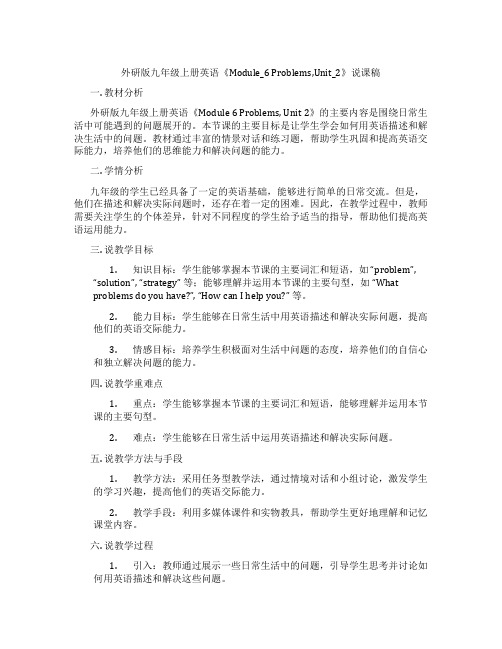
外研版九年级上册英语《Module_6 Problems,Unit_2》说课稿一. 教材分析外研版九年级上册英语《Module 6 Problems, Unit 2》的主要内容是围绕日常生活中可能遇到的问题展开的。
本节课的主要目标是让学生学会如何用英语描述和解决生活中的问题。
教材通过丰富的情景对话和练习题,帮助学生巩固和提高英语交际能力,培养他们的思维能力和解决问题的能力。
二. 学情分析九年级的学生已经具备了一定的英语基础,能够进行简单的日常交流。
但是,他们在描述和解决实际问题时,还存在着一定的困难。
因此,在教学过程中,教师需要关注学生的个体差异,针对不同程度的学生给予适当的指导,帮助他们提高英语运用能力。
三. 说教学目标1.知识目标:学生能够掌握本节课的主要词汇和短语,如“problem”,“solution”, “strategy” 等;能够理解并运用本节课的主要句型,如“Whatproblems do you have?”, “How can I help you?” 等。
2.能力目标:学生能够在日常生活中用英语描述和解决实际问题,提高他们的英语交际能力。
3.情感目标:培养学生积极面对生活中问题的态度,培养他们的自信心和独立解决问题的能力。
四. 说教学重难点1.重点:学生能够掌握本节课的主要词汇和短语,能够理解并运用本节课的主要句型。
2.难点:学生能够在日常生活中运用英语描述和解决实际问题。
五. 说教学方法与手段1.教学方法:采用任务型教学法,通过情境对话和小组讨论,激发学生的学习兴趣,提高他们的英语交际能力。
2.教学手段:利用多媒体课件和实物教具,帮助学生更好地理解和记忆课堂内容。
六. 说教学过程1.引入:教师通过展示一些日常生活中的问题,引导学生思考并讨论如何用英语描述和解决这些问题。
2.新课呈现:教师通过情境对话,展示本节课的主要句型和词汇。
引导学生进行模仿和练习。
3.课堂实践:教师学生进行小组讨论,让他们运用本节课所学的内容,描述和解决实际问题。
外研版九年级上册英语《Module_6 Problems,Unit_2》教学设计

外研版九年级上册英语《Module_6 Problems,Unit_2》教学设计一. 教材分析《Module 6 Problems, Unit 2》的主要内容是围绕日常生活中可能遇到的问题进行讨论,通过学习,学生能够掌握如何描述问题,并提出解决方案。
本节课的主要话题是关于如何处理家庭作业的问题,通过本节课的学习,学生能够学会如何用英语表达家庭作业的难度,以及如何向他人寻求帮助。
二. 学情分析九年级的学生已经具备了一定的英语基础,能够进行简单的英语交流。
但是,对于一些较复杂的句子结构和词汇,学生可能还不太熟悉。
因此,在教学过程中,需要结合学生的实际情况,适当降低难度,让学生能够更好地理解和掌握所学内容。
三. 教学目标1.知识目标:学生能够掌握与家庭作业相关的词汇和短语,如“homework”, “difficult”, “help”。
2.能力目标:学生能够用英语描述家庭作业的难度,并能够向他人寻求帮助。
3.情感目标:学生能够意识到合作的重要性,学会与他人共同解决问题。
四. 教学重难点1.重点:家庭作业相关的词汇和短语。
2.难点:如何用英语描述家庭作业的难度,并能够向他人寻求帮助。
五. 教学方法采用任务型教学法,让学生在实际的任务中,学会如何用英语描述问题,并提出解决方案。
同时,结合小组合作学习,让学生在互动中,提高英语表达能力。
六. 教学准备1.准备相关的家庭作业图片,用于展示和引导学生进行讨论。
2.准备一些关于家庭作业难度的词汇和短语,用于教学。
七. 教学过程1.导入(5分钟)教师展示一些关于家庭作业的图片,引导学生进行讨论。
例如,可以问学生:“你们觉得家庭作业难吗?为什么?”让学生用英语表达自己的观点。
2.呈现(10分钟)教师呈现本节课的主要内容,包括与家庭作业相关的词汇和短语,以及如何用英语描述家庭作业的难度。
教师可以通过例句和情景模拟,让学生理解和掌握所学内容。
3.操练(10分钟)教师学生进行小组操练,让学生模拟真实场景,用英语描述家庭作业的难度,并寻求他人帮助。
新外研版九年级上册英语 Module 6 Unit 2 教案(教学设计)
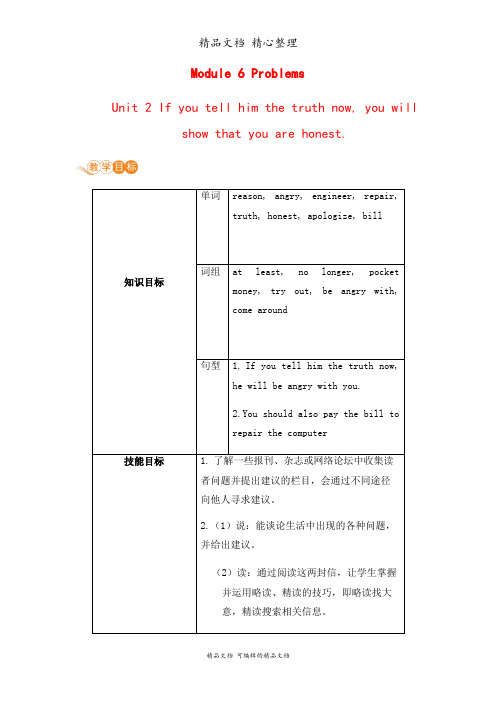
Module 6 ProblemsUnit 2 If you tell him the truth now, you will show that you are honest.单词reason, angry, engineer, repair,if引导的条件状语从句。
if引导的条件状语从句主从句的时态问题。
通过图片所提供的信息导入新课,引起学生的兴趣。
Step 1 Warming up and presentation1. 课前导入,图片搭配问题展示本课内容。
2. 列出本语篇重要单词,领读这些单词,让学生们尽力熟悉并记住它Step 2 Pre-reading1.Look at the letter and the reply in Activity2. Decide where they come from. (Activity 1)(1)教师请一位学生读一封有关自己或他人烦恼的信,让全班帮忙想一想有什么可行的解决办法。
(2)全班讨论如果自己遇到烦恼时会通过什么方法或途径去解决,教师总结学生提供的方法, 然后引入本课话题:阅读Steve有什么烦恼,他是通过什么方式来解决的。
(3)快速略读来信及回复,进行判断。
(4)教师点名,个体回答,交流反馈。
环节说明:本环节旨在明确本单元学习主题,让学生快速进入学习状态和英语语言情境中。
2.Read the letter and the reply. Choose the best summary of Steve’sproblem. (Activity 2) (1)学生个体活动,阅读文后给出的三个选项,理解其意思。
(2)快速略读,提炼课文主旨,进行选择。
(3)两人一组核对答案。
(4)教师点名,个体汇报,陈述排除其他选项的理由。
Step 3 Language pointsTo learn about the main points in the passage.1. Last week, my friend David came round with a new computer game. come round表示“拜访(某人的家)”。
外研版英语九上Module6《Problems》模块说课稿

外研版英语九上Module 6《Problems》模块说课稿一. 教材分析《Problems》是外研版英语九上Module 6的第一课时,本节课的主要内容是讨论人们面临的问题和困难,以及如何解决这些问题。
本节课的主要语言点是情态动词“have to”的用法,以及如何运用交际策略来表达问题和解决方案。
通过本节课的学习,学生能够更好地理解和运用情态动词“have to”,并能运用交际策略来讨论问题和解决方案。
二. 学情分析在进入九年级的学习阶段,学生们已经掌握了基本的英语语法和词汇知识,具备了一定的听说读写能力。
然而,对于情态动词“have to”的用法以及如何运用交际策略来讨论问题和解决方案,学生们可能还存在一些困难。
因此,在教学过程中,需要针对学生的实际情况进行有针对性的教学。
三. 说教学目标1.知识目标:学生能够掌握情态动词“have to”的用法,理解其表示的义务和必要性。
学生能够运用交际策略来讨论问题和解决方案。
2.能力目标:学生能够在真实情境中运用情态动词“have to”进行交流,提高听说读写的能力。
3.情感目标:通过讨论问题和解决方案,培养学生积极面对问题和困难的态度,培养学生的团队合作精神。
四. 说教学重难点1.教学重点:情态动词“have to”的用法,以及如何运用交际策略来讨论问题和解决方案。
2.教学难点:情态动词“have to”的用法在实际语境中的运用,以及如何运用交际策略来表达问题和解决方案。
五. 说教学方法与手段在教学过程中,我将采用任务型教学法,情境教学法和交际法进行教学。
通过设定各种真实的情境,让学生在实践中学习和运用情态动词“have to”和交际策略。
同时,我将运用多媒体教学手段,如PPT和视频,来提供丰富的教学资源和真实的语言环境。
六. 说教学过程1.导入:通过展示一些图片,让学生猜测图片中的人们可能面临的问题和困难,激发学生的学习兴趣。
2.呈现:通过PPT展示本节课的主要内容,让学生整体感知和理解。
外研版九年级英语上册 Module 6 Problems 全模块各单元教学设计 教案
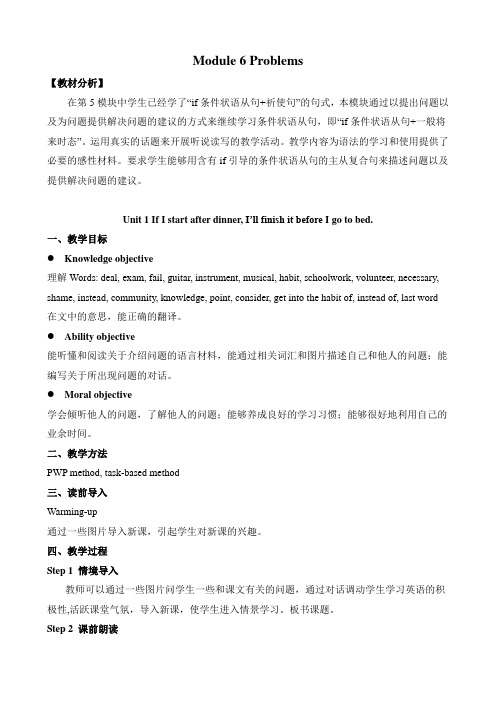
Module 6 Problems【教材分析】在第5模块中学生已经学了“if条件状语从句+祈使句”的句式,本模块通过以提出问题以及为问题提供解决问题的建议的方式来继续学习条件状语从句,即“if条件状语从句+一般将来时态”。
运用真实的话题来开展听说读写的教学活动。
教学内容为语法的学习和使用提供了必要的感性材料。
要求学生能够用含有if引导的条件状语从句的主从复合句来描述问题以及提供解决问题的建议。
Unit 1 If I start after dinner, I’ll finish it before I go to bed.一、教学目标●Knowledge objective理解Words: deal, exam, fail, guitar, instrument, musical, habit, schoolwork, volunteer, necessary, shame, instead, community, knowledge, point, consider, get into the habit of, instead of, last word 在文中的意思,能正确的翻译。
●Ability objective能听懂和阅读关于介绍问题的语言材料,能通过相关词汇和图片描述自己和他人的问题;能编写关于所出现问题的对话。
●Moral objective学会倾听他人的问题,了解他人的问题;能够养成良好的学习习惯;能够很好地利用自己的业余时间。
二、教学方法PWP method, task-based method三、读前导入Warming-up通过一些图片导入新课,引起学生对新课的兴趣。
四、教学过程Step 1 情境导入教师可以通过一些图片问学生一些和课文有关的问题,通过对话调动学生学习英语的积极性,活跃课堂气氛,导入新课,使学生进入情景学习。
板书课题。
Step 2 课前朗读1. 朗读单词Words: deal, exam, fail, guitar, instrument, musical, habit, schoolwork, volunteer, necessary, shame, instead, community, knowledge, point, consider,get into the habit of, instead of, last word注意单词中每个音节的发音和字母组合。
M6-Problems单元整体教学设计-外研版九年级上册英语
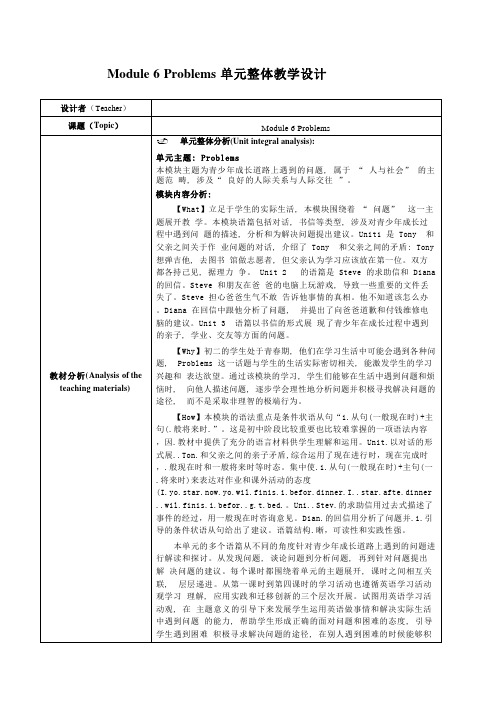
3.归.i.条件状语从句的语法规则;
4.在具体情境中,综合运用所学以口头或书信的形式讲述个人遇到的.题,分析问题并提出解决问题的途径。
(二)文化意识:
1.在人际交往中,尝试理解对方的感受;
2.感悟诚实,友善等中外社会生活中的传统美德;
第二单元(Unit2)
阅读思考
I.课.(Topic)
Unit 2 Ifyou tell him the truth now, you will show that youarehonest.
(Reading&thinking)
II.教学目标(Teachin.aims)
通过本课时学习, 学生能够:
1.在读和看的过程中,获取两封信的主旨大意,梳理第一封.Stev.’. .具体问题以及第二封.Dian.提出的具体建议;(学习理解)
III.教学重、难点(Ke.point.an.difficulties)
1..能识别求助信中的问题并给出合理的建议;
2..能基于写作要点.以书面的形式回复求助信的问题。
2.能基于写作要点,以书面的形式回复求助信的问题。
2.能基于写作要点,以书面的形(Promotion&assessment)
本单元的多个语篇从不同的角度针对青少年成长道路上遇到的问题进行解读和探讨。从发现问题,谈论问题到分析问题,再到针对问题提出解决问题的建议。每个课时都围绕着单元的主题展开,课时之间相互关联,层层递进。从第一课时到第四课时的学习活动也遵循英语学习活动观学习理解,应用实践和迁移创新的三个层次开展。试图用英语学习活动观,在主题意义的引导下来发展学生运用英语做事情和解决实际生活中遇到问题的能力,帮助学生形成正确的面对问题和困难的态度,引导学生遇到困难积极寻求解决问题的途径,在别人遇到困难的时候能够积极为他人出谋划
Module 6 Problems 知识点详解 外研版九年级英语上册(含总结)

Module 6 Problems 知识点详解讲义Unit 1P421.spend 的主语必须是人,常用于以下结构:(1)Spend money\time on sth Spend money\time (in)doing sth 在….上花费时间(金钱)。
I spent two hours on this maths problem.这道数学题花了我两个小时。
They spent two years(in)building this bridge.造这座桥花了他们两年时间。
2.stop from doing 阻止某人做某事prevent from doing3.have guitar lessons上吉他课have a guitar lesson take a guitar lesson4.agree with sb/sth同意某人意见an agreement disagree5.suggest doing suggestion cn advice un advise doing advise sb doing sth6. deal n. 协议The Japanese Government had a secret deal with Germany during the Second World War.第二次世界大战时,日本政府和德国订有密约。
I'll try to make a deal with him. 我试着和他达成协议。
deal n .交易;大量I send Joe to do a deal with them.我派乔去与他们做交易。
He had a deal of work to do.他有许多工作要做。
a(great)deal of 大量的7. IfI start after dinner, I'll finish it before I go to bed.本句是if引导的条件状语从句,句式为“If 从句(一般现在时)+主句(一般将来时)”Ifyou fail in the exam,you will let him down.如果你考试不及格,你会让他失望的。
新外研版九年级英语上Module6 Problems

Module6Unit1课文导学1.Tony is spending too much time playing the guitar, and he may fail his exams.托尼花太多时间弹吉他,考试可能会不及格的。
(1)spend...doing sth.花.....,做某事如:His father spent two hours making this kite.他爸爸花了两个小时制作这个风筝。
(2)too much time太多时间注意:too much修饰不可数名词,意为“太多”;too many修饰复数可数名词。
2.Tony’s parents want to stop him enjoying music, although they have made a deal with him before.托尼的父母想要阻止他玩音乐,虽然他们以前已经和他商量过。
(1)stop sb (from) doing sth阻止某人做某事类似的短语有:prevent sb. (from) doig sth阻止某人做某事ban sb.(from) doing sth禁止某人做某事如:The boss stopped the workers (from) leaving work early.老板阻止工人早下班。
(2)make a deal with商量;协议如:I’ll make a deal with you. You make the trip downtown and I’ll give you more money.我想跟你商量。
你到市区一趟,我给你多付钱。
3.I want you get into the habit of doing your homework as soon as you come home from school.我想让你养成一放学回家就做家庭作业的习惯。
- 1、下载文档前请自行甄别文档内容的完整性,平台不提供额外的编辑、内容补充、找答案等附加服务。
- 2、"仅部分预览"的文档,不可在线预览部分如存在完整性等问题,可反馈申请退款(可完整预览的文档不适用该条件!)。
- 3、如文档侵犯您的权益,请联系客服反馈,我们会尽快为您处理(人工客服工作时间:9:00-18:30)。
Module6Unit1课文导学1.Tony is spending too much time playing the guitar, and he may fail his exams.托尼花太多时间弹吉他,考试可能会不及格的。
(1)spend...doing sth.花.....,做某事如:His father spent two hours making this kite.他爸爸花了两个小时制作这个风筝。
(2)too much time太多时间注意:too much修饰不可数名词,意为“太多”;too many修饰复数可数名词。
2.Tony’s parents want to stop him enjoying music, although they have made a deal with him before.托尼的父母想要阻止他玩音乐,虽然他们以前已经和他商量过。
(1)stop sb (from) doing sth阻止某人做某事类似的短语有:prevent sb. (from) doig sth阻止某人做某事ban sb.(from) doing sth禁止某人做某事如:The boss stopped the workers (from) leaving work early.老板阻止工人早下班。
(2)make a deal with商量;协议如:I’ll make a deal with you. You make the trip downtown and I’ll give you more money.我想跟你商量。
你到市区一趟,我给你多付钱。
3.I want you get into the habit of doing your homework as soon as you come home from school.我想让你养成一放学回家就做家庭作业的习惯。
get into the habit of养成做某事如:He got into the habit of getting up early in America.在美国他养成了早期的习惯。
4.I can work in the library and I’m also able to read books there.我可以在图书馆干活儿,而且还能在那儿看书。
be able to do sth.能够做某事;有能力做某事要点联想辨析:be able to和canbe able to和can都表示“能够”,但二者有所不同。
be able to一般指个人能力所能做到的事情,有人称和数的变化,can一般指客观情况下所能做到的事情,有can和c ould两种形式。
如:He was able to ride a bike when he was 8 years old.=He could ride a bike when he was 8 years old.他八岁的时候就会骑自行车了。
5.If you do all these other things instead of your homework, you won’t have time to study.如果这些你都做,而不做作业,你就没有时间学习了。
instead of而不是如:He stayed at home instead of going to the cinema last night.昨晚他待在家里,而没有去看电影。
即学即练()1.I have homework to do, so I can’t go to the cinema with you.A.too manyB.too muchC.much too()2.He habit of eating less.A.gets intoB.gets upC.get on()3.She eats vegetables meat. Because they are good for her health.A.toB.instead ofC.as soon as4.我们花了三个小时才到达山顶。
We to the top of the mountain.5.政府阻止工厂污染水源。
The government the water.6.你不能跟我们去游泳,真遗憾!!You can’t go swimming with us.百分导学(一)词汇专练:根据所给的首字母提示,把句子补充完整。
每空一词。
1.They are learning to play the g .2.There is a big final e at the end of the term.3.They are playing the i aloud.4.Let’s make a d about the start time.5.Please form a h to get up early.6.What a s ! You missed the concert.7.The c holds a meeting every day.8.The teacher spreads k around the country.9.He f in the exam even though he tried hard.10.He c it hard before he accepted it.(二)单项选择。
()1.Don’t spend too much time computer games. It’s bad for your eyes.A.playB.playingC.to play()2.Our teacher wants us playing basketball because of the rain.A.to stopB.stopC.stopping()3.If I get up earlier, I the airport on time.A.will reachB.reachC.have reached()4.I would like to do some reading instead of online.A.chatB.to chatC.chatting()5.I’m sorry, there is a traffic accident on my way to work.A.andB.becauseC.but(三)完成句子。
1.我妈妈花了两个小时才做好饭。
My mother the meal.2.老师阻止学生冲向饭堂。
The teacher to the dining hall.3.我想和你商量一下。
我想花一百元买两件。
I’ll you. I’d like to buy two for one hundred yuan.4.我们都不同意他的做法。
We don’t him.5.在老师的帮助下他养成了大声朗读的习惯。
He reading loudly with the help of the teacher.Unit21.If you tell him the truth now, you’ll show that you are honest.如果你告诉他真相,就会证明你是证实的。
truth意为“事实;真相”,其形容词是true。
truth的常见搭配:tell the truth讲真话;告诉真相。
如:He was true to his job.他忠于职守。
You’d better tell us the truth at once.你最好立刻告诉我们真相。
st week, my friend David came round with a new computer game and asked to play it on my dad’s computer. 上周,戴维带了一个新的电脑游戏来,并要求在我爸爸的电脑上玩。
come round拜访(某人的家)如:Can we come round to your house together?我们今晚能到你家去吗?3....I can only use it for my homework....我只能用它来做作业。
use作动词,意为“利用;用;使用”use sth.for doing sth=use sth to do sth使用某物做某事如:May I use your pencil?我能用你的铅笔吗?We use a pen for writing.我们用钢笔写字。
4.We copied it to the computer, and after we finished playing, we took it off the computer.我们把它复制到电脑上,当我们结束游戏后,又把它从电脑上卸载下来。
(1)copy sth to sth把某物复制到某物上如:You mustn’t copy the article to your essay.你不准把这篇文章复制到你的论文上。
(2)take off卸载要点联想常见与take的搭配:take care of照顾;照料 take down取下;放下;记下 take a message for...给......捎信take exercise锻炼 take hold of抓住 take off脱掉 take part in参加take...out of... 把......从......取出来 take turns轮流5.He could no longer find the documents anywhere!他再也找不到他的文件了!no longer不再如:You are no longer a child. You should go there alone.你不再是个孩子了,你应当一个人去那儿。
6.I did not tell him about the computer game because I did not want him to be angry with me.be angry with生某人的气如:He was never be angry with his parents.他从没有生过父母的气。
7....but at least you will show that you are honest.......但你至少能证明你是诚实的。
least adj.意为“至少的;最小的”,是little的最高级,其比较级为less.at least 至少反义词:at most至多如:He often talks most and does least.他总是说得最多,做得最少。
